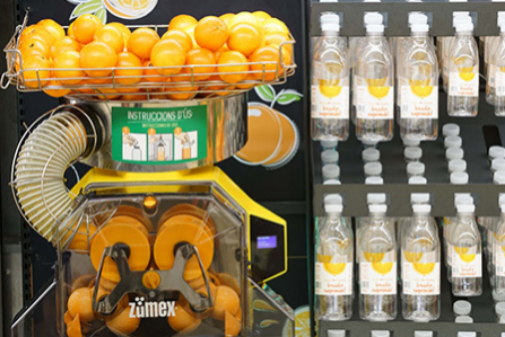The Organization of Consumers and Users (OCU) has confirmed, through the realization of a comparative analysis, that there is no hygienic risk in the juice s that are squeezed in supermarkets; The analyzed products are safe and their consumption at the time of their preparation and packaging or after 24 hours is also safe . In addition, the same study responds to the urban legend about vitamin C.
The orange juice that is squeezed in the supermarket itself has gained popularity in recent years and is already consumed by one in ten families. It is a natural product that does not carry any preservative or heat treatment and that is why the OCU has analyzed 24 samples of juice purchased in eight supermarket chains: Carrefour, Alcampo, Mercadona, Hipercor, Ahorramás, Lidl, Aldi, Dia .
The study was carried out with half-liter containers, whose prices ranged between 1.75 in Alcampo and 2.25 in Aldi, Hipercor or Mercadona. If you squeeze it at home, that half a liter of juice would cost you around 0.80 euros in orange season, but outside of it, the difference with the juice of the supermarket is reduced. The conclusion is that consuming these products is more expensive than making the juice at home , "especially in season."
Microbiological study
In the laboratory a complete microbiological study was made after purchase and it was verified what happened after leaving them in the refrigerator for 24 hours. According to the OCU, the juices were purchased between 12.00 and 16.00 in the afternoon, when the machines had already been working for several hours . In the laboratory it was checked whether there were microorganisms and bacteria such as Enterobacteria, Escherichia coli, Staphylococcus aureus, Listeria or Salmonella. The result of the OCU is that "there are no hygiene problems".
"No microorganisms that cause diseases are detected and the rest appear in acceptable quantities . These products are safe and their consumption at the time of purchase and at 24 hours, which is the expiration date that appears on the package, presents no risks. After one day, the juice is still perfectly suitable for drinking if you have kept it refrigerated and provided you have not drunk directly from the bottle, "says the OCU study.
However, the OCU clarifies that the "hygienic quality of these juices may not always be the same , since it depends on how and how often the juicer machine is cleaned." The inside of the orange is free of bacteria , but the juice can become contaminated by coming into contact with the bacteria found on the surface of the orange peel.
In the same way, the OCU took advantage of the study to verify if the urban legend is true that vitamin C is very delicate and is lost immediately when squeezing the orange. "In the laboratory we measure the amount of vitamin C contained in the samples on the day of purchase and also after 24, 48 and 72 hours. The results are clear: it is not clear that vitamin C is lost over time , since the levels they remain stable as long as the juice has been kept cold . "
According to the criteria of The Trust Project
Know more- savings and consumption
- economy
ConsumptionEl cava, a new cession of Pedro Sánchez to Catalonia for his investiture
ConsumoMoody's warns that the slowdown in Spain raises the risks of payment of consumer loans
Consumption The economic slowdown is already noticeable at Christmas

